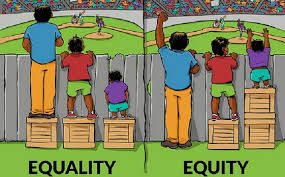It would be an understatement to say that the last year has been tough on all of us as a school community.
A prolonged forced seclusion, and a wholesale shift to virtual learning, have been difficult and challenging at times.
My perception of our hardships got a reality check when the security guard in my building requested us for a spare phone. It turned out that his family had only one smartphone, which he needed to carry to work. This left his 8-year-old son with no means to attend the virtual classes his school had organised for him.
Within our school community, we are fortunate enough not to have to deal with such fundamental impediments to learning. We have enabled our students to thrive with online classes, blended learning opportunities and the enrichment programme. However, it did get me thinking about which other types of disparities and diversity in circumstance we ignore on a regular basis.
If you ask different people about their understanding of diversity, you will get different answers. For corporate India, diversity is a lot about having more women in the workplace. For a school such as ours, it is about offering a valuable teaching and learning experience to students from various nationalities with differing proficiency in languages. For a lot of others, it is about the differences of race and the colour of their skin.
Roy Gluckman, an expert on the matter, a qualified attorney of the High Court of South Africa and the founder of Cohesion Collective, pointed out during his workshop in the IB Virtual Conference 2020 that there is more to diversity than our physical attributes. Diversity of thought and feeling is the most challenging of all because differing thoughts and ideologies are deeply ingrained in us, are often generational and represent differences that are tough to reconcile.
This rings true as soon as you start thinking about it. In today’s world, people who identify as liberal or conservative, right-wing or left-wing, religious or agnostic, have more real differences than people who simply look different or talk different. This diversity in ideas, in the absence of skills to make sense of it, is one of the challenges our world faces today.
As educators, I feel that dealing with this diversity in thought and ideas, is one of the most important skills we can impart to our students – being able to empathise with another person’s viewpoint, even if it differs from your own; being able to entertain an idea for the sake of discussion, without accepting it; or having the intellectual flexibility to change your viewpoint, when faced with new facts or reasons.
This, I feel, is how we should reframe the way we think about diversity and inclusion, and our role as educators.
‘Equality’ is an equally important, and equally misunderstood, related concept. In the same IB Virtual Conference workshop that I mentioned above, Roy Gluckman pointed out, ‘True equality is treating different people, differently.’
Think about this for a minute.
True equality is about treating different people differently to enable access to equal opportunity. The image below explains this much better than words can.

My building security guard’s son now has my spare phone with which to attend his virtual classes. Thousands of other children may not be as fortunate and may have to wait until schools open physically to get back to learning. Hopefully, with several vaccines now available, and the end of the pandemic in sight, this will happen soon.
It is interesting to note that two of the most effective vaccines in the world today, are based on mRNA technology, which was an outcome of the research of a young biochemist, Katalin Karik, who had migrated to the US in the late 1980s. At the time, she did not have a credit card or even a mobile phone.
The fact that she still got equal access to opportunity is why many children today will get the same.
Bibliography:
- Bendixdec, Aria. “BioNTech scientist Katalin Karikó risked her career to develop mRNA vaccines. Americans will start getting her coronavirus shot on Monday.” 13 December 2020. Business Insider India. 4 February 2021.
- Gluckman, Roy. “Is Our World Really Changing? Diversity and Inclusion in 2021.” IB Virtual Conference 2020. n.d. Zoom Session. 9 December 2020.
- Photo credits: Maguire, Angus. Interaction Institute for Social Change | Artist: Angus Maguire interactioninstitute.org and madewithangus.com
(Written after being inspired by Roy Gluckman’s talk on Diversity and Inclusion at the IB Virtual Conference 2020)

